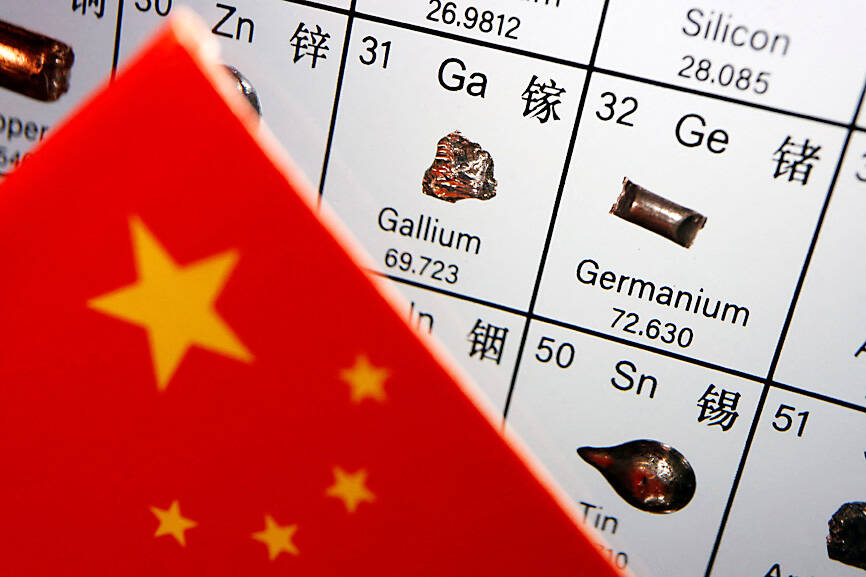China yesterday said it would restrict exports to the US of some key components in making semiconductors, after Washington announced curbs targeting Beijing’s ability to make advanced chips.
Among the materials banned from export are metals gallium, antimony and germanium, Chinese Ministry of Commerce said in a statement that cited “national security” concerns.
Exports of graphite would also be subject to “stricter reviews of end-users and end-uses,” it said.

Photo: Reuters
“To safeguard national security interests and fulfill international obligations such as non-proliferation, China has decided to strengthen export controls on relevant dual-use items to the United States,” Beijing said.
“Any organization or individual in any country or region violating the relevant regulations will be held accountable according to the law,” it added.
China accounts for 94 percent of the world’s production of gallium — used in integrated circuits, LEDs and photovoltaic panels — according to a report by the EU published this year.
For germanium, essential for fiber optics and infrared, China makes up 83 percent of production.
In its own latest curbs, Washington on Monday announced restrictions on sales to 140 companies, including Chinese chip firms Piotech Inc (拓荊科技) and SiCarrier Technologies Co (新凱來), without additional permission.
They also impact Naura Technology Group Co (北方華創), which makes chip production equipment, the US Department of Commerce said.
The move expands Washington’s efforts to curb exports of state-of-the-art chips to China, which can be used in advanced weapons systems and artificial intelligence.
The new US rules also include controls on two dozen types of chipmaking equipment and three kinds of software tools for developing or producing semiconductors.
Separately, Dutch tech giant ASML Holding NV, which supplies chipmaking machines for the semiconductor industry, brushed off the announcement of fresh US export curbs to China, keeping its forecasts unchanged.
“For 2024, we do not expect any direct material impact on our business,” the firm said in a statement late on Monday.
“For 2025, we expect that the impact will fall within what was communicated at the time of our Q3 [third quarter] 2024 earnings,” it added.
The firm projected total net sales for next year of 30 billion to 35 billion euros (US$31,56 billion to US$36.82 billion), with sales from China making up about one-fifth of that.
Over the longer term, the new curbs did not impact its predictions for the health of the industry as a whole, ASML said.
“We therefore also confirm potential 2030 scenarios for annual total net sales between approximately 44 billion and 60 billion euros,” it said.

CHIP WAR: Tariffs on Taiwanese chips would prompt companies to move their factories, but not necessarily to the US, unleashing a ‘global cross-sector tariff war’ US President Donald Trump would “shoot himself in the foot” if he follows through on his recent pledge to impose higher tariffs on Taiwanese and other foreign semiconductors entering the US, analysts said. Trump’s plans to raise tariffs on chips manufactured in Taiwan to as high as 100 percent would backfire, macroeconomist Henry Wu (吳嘉隆) said. He would “shoot himself in the foot,” Wu said on Saturday, as such economic measures would lead Taiwanese chip suppliers to pass on additional costs to their US clients and consumers, and ultimately cause another wave of inflation. Trump has claimed that Taiwan took up to

A start-up in Mexico is trying to help get a handle on one coastal city’s plastic waste problem by converting it into gasoline, diesel and other fuels. With less than 10 percent of the world’s plastics being recycled, Petgas’ idea is that rather than letting discarded plastic become waste, it can become productive again as fuel. Petgas developed a machine in the port city of Boca del Rio that uses pyrolysis, a thermodynamic process that heats plastics in the absence of oxygen, breaking it down to produce gasoline, diesel, kerosene, paraffin and coke. Petgas chief technology officer Carlos Parraguirre Diaz said that in

Japan intends to closely monitor the impact on its currency of US President Donald Trump’s new tariffs and is worried about the international fallout from the trade imposts, Japanese Minister of Finance Katsunobu Kato said. “We need to carefully see how the exchange rate and other factors will be affected and what form US monetary policy will take in the future,” Kato said yesterday in an interview with Fuji Television. Japan is very concerned about how the tariffs might impact the global economy, he added. Kato spoke as nations and firms brace for potential repercussions after Trump unleashed the first salvo of

SUPPORT: The government said it would help firms deal with supply disruptions, after Trump signed orders imposing tariffs of 25 percent on imports from Canada and Mexico The government pledged to help companies with operations in Mexico, such as iPhone assembler Hon Hai Precision Industry Co (鴻海精密), also known as Foxconn Technology Group (富士康科技集團), shift production lines and investment if needed to deal with higher US tariffs. The Ministry of Economic Affairs yesterday announced measures to help local firms cope with the US tariff increases on Canada, Mexico, China and other potential areas. The ministry said that it would establish an investment and trade service center in the US to help Taiwanese firms assess the investment environment in different US states, plan supply chain relocation strategies and